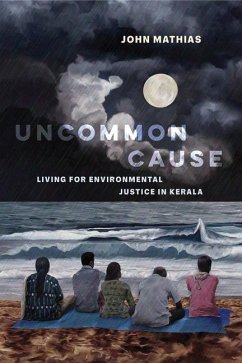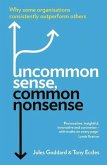"A wonderful ethnographic journey into the ethical lives of environmental justice activists in India. Uncommon Cause is a careful study of what happens when people choose to devote themselves entirely to values. In some cases, that means sacrificing relationships and community ties, or finding it hard to translate their lofty goals into decisive collective action. In the most basic terms, this is a book that seeks to answer the question, 'How should we live?'"--Joshua O. Reno, co-author of Imagining the Heartland: White Supremacy and the American Midwest "This book is to be commended for considering how different individuals and movements operate within a political milieu that is highly literate with a lively tradition of communist politics, but in which politics still feels very established and restrictive. It describes how environmentalism becomes for some people a lifelong commitment, for some a passing experiment, and for others what they strategically mobilize to demand that their own pollution-riven environment be made habitable. Uncommon Cause is a must-read for anyone trying to come to terms with the contradictions marking our efforts to live sustainably."--Naveeda Khan, author of In Quest of a Shared Planet: Negotiating Climate from the Global South "With striking sensitivity, John Mathias documents how environmental activists in Kerala variously evaluate and situate themselves in 'common cause, ' and thus how they scale community, organize their relationships, imagine justice, and work toward different futures. Uncommon Cause advances the anthropology of ethics, as well as the social scientific study of activism."--E. Summerson Carr, author of Working the Difference: Science, Spirit, and the Spread of Motivational Interviewing "Based on ethnographic research with environmental activists in Kerala, Uncommon Cause demonstrates the power of anthropology to ask fundamental questions about the place of political action, local norms, and individual ethics in everyday social life. Mathias offers a distinction between what he calls 'living for' (a goal or cause) and 'living from' (a particular cultural context) to ponder not just the various pressures that constitute contemporary activism in southwestern India, but also the implications such dynamics have for how anthropologists both engage research collaborators as political actors and express their own political commitments. Students will get a great deal out of this powerful ethnography."--John L. Jackson, Jr., author of Thin Description: Ethnography and the African Hebrew Israelites of Jerusalem "In vivid detail and with critical depth, Uncommon Cause explores the lives, choices, and seeming contradictions among environmental activists in Kerala, India. The tensions between community and cause, family and purpose, living for and living from invite the reader to think deeply about environmental activism--its ethics, its hopes, its failures, and what readers themselves will do as the urgency of environmental injustice increases with each passing day."--Lisa Reyes Mason, Interim Dean of the Graduate School of Social Work, University of Denver "As the world teeters on the edge of climate catastrophe, this deeply thoughtful book is a vital reminder that environmental activism has a human face. Offering a compassionate, insightful analysis of the relational complexities inherent in environmental action, it is a must-read for scholars, teachers, and students of everyday environmental ethics."--Susan Kemp, Professor of Social Work, University of Auckland "Activist commitment makes for a vexing place in the world, with one foot in collective life as it stands and another in the world imagined as it ought to be. In this vivid and graceful ethnography, Mathias conveys the everyday dilemmas of an activist life with unusual sensitivity and remarkable detail."--Anand Pandian, author of A Possible Anthropology: Methods for Uneasy Times "I deeply appreciate this book for its profound insight into the complicated intersections of community building, identity, and environmental activism. Drawing from captivating narratives, the book vividly portrays the often unseen tensions faced by environmental activists, whose dedication to radical environmentalism challenges their familial and communal relationships. Mathias masterfully uncovers how these dynamics propel, challenge, and define environmental justice in Kerala and beyond."--Michael S. Spencer, Dean of the School of Social Work, University of Washington
Hinweis: Dieser Artikel kann nur an eine deutsche Lieferadresse ausgeliefert werden.
Hinweis: Dieser Artikel kann nur an eine deutsche Lieferadresse ausgeliefert werden.








